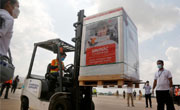"Juvenile caregivers" reflect troubles of Japan’s aging society
Japan has a specific word "juvenile caregivers", which refers to underage students who are both attending school and taking care of their family members.
Mai became a caregiver in grade 11. As her grandpa is diagnosed with cancer, her grandma has dementia, and her parents are busy with work, she often needs to go to the hospital during the day to fill out different paperwork for her grandpa, and take care of her grandma at home at night. Due to the heavy domestic burden, Mai dropped out of band activities at school, often comes to school late and leaves early, and her grades have continued to drop. In the end, Mai decided to give up her first choice of attending a national university in another part of the country, and chose a local school instead.
How heavy is the burden of an aging society? How much pressure do young people bear? The Ministry of Health, Labor and Welfare and the Ministry of Education, Science and Technology of Japan conducted an online survey covering 1,350 full-time public middle and high schools, which revealed 5.7% of middle school students and 4.1% of high school students have to undertake the caregiving tasks at home.
In a survey published by NHK, the burden of home nursing has taken its toll on high school students with regards to pursuing higher education or seeking employment. In an NHK survey of public high schools in Saitama Prefecture, over one-third of schools have scenarios where students are locked into the chores of home nursing. At least 126 students from 46 high schools consider taking care of family members a tremendous pressure in their pursuit of higher education and finding employment. Among them, 44 students indicate they were forced to give up their ideal choices.
Professor Hamashima Suki from Osaka Dental University says this is only the tip of an iceberg. Many teachers state the actual number of students trapped in home care may be much larger. Students who gave up higher education due to economic issues might also face the problem of being young caregivers.
As is well known, developed countries that have already entered aging society have relatively mature institutional designs. In Japan, aside from endowment insurance and medical care insurance, the “Nursing Insurance Law” was also introduced in 1997, and came into effect in 2000. Nursing insurance, endowment insurance, and medical care insurance, are altogether called the “three treasures” of Japan in combating aging.
In Japan, including foreigners who are long-term residents, caregiving insurance is required at the age of 40. When elderly people have limited self-care abilities, they can enjoy different levels of aid or nursing services according to the different physical conditions. These include door-to-door assistance services, home care services, and checking into senior homes.
However, as the population structure continues to deteriorate, the generous welfare guarantees that used to make Japanese citizens feel relieved and proud are being challenged. The increasingly severe aging tendency not only causes senior people to receive pensions for longer, the expanding medical and caregiving expenditures and other financial problems will also create more economic and social issues.
Japan’s nursing care insurance policy has been in existence for 20 years, despite repeated reforms and adjustments, there are still many segments which need refinement and perfection.
According to statistics from the Ministry of Health, Labor and Welfare, in recent years, there are around 100,000 people who have to leave work to take care of their family members annually. Estimates from the Ministry of Economy, Trade and Industry show, every year, related economic loss caused by this is around 650 billion yen (1 USD is approximately 108 yen).
Hamashima says, since Japan’s socialized caregiving support system is inadequate, home nursing has to depend on family members and children. In a rigid society like Japan, if children fall behind at pivotal moments of entering a higher school or seeking employment, this will have tremendous impacts for the rest of their lives, and might create a social problem. Hamashima believes Japan should actively construct a caregiving support system that is not dependent on family members.
Regarding the problem of juvenile caregivers, Hamashima points out more improvements need to be implemented to let public institutions better convey aid information to those in need. Schools can set up related consulting services, schools and welfare institutions can open up a path of communication through school social workers. This can help troubled youngsters obtain relevant welfare assistance and get out of their predicaments.
Written by: Liu Chunyan, published by Xinhua News Agency
[ Editor: JYZ ]










More From Guangming Online
Medics from Fujian leave for Shanghai to aid in battle against COVID-19 resurgence
New int'l land-sea transport service to Indo-China Peninsula launched
Another makeshift hospital under construction in Shanghai
Tourists view tulips in Suiping County, Henan
In pics: blooming gagea flowers on grassland in Zhaosu, Xinjiang
Greek workers stage 24-hour general strike over high prices